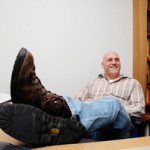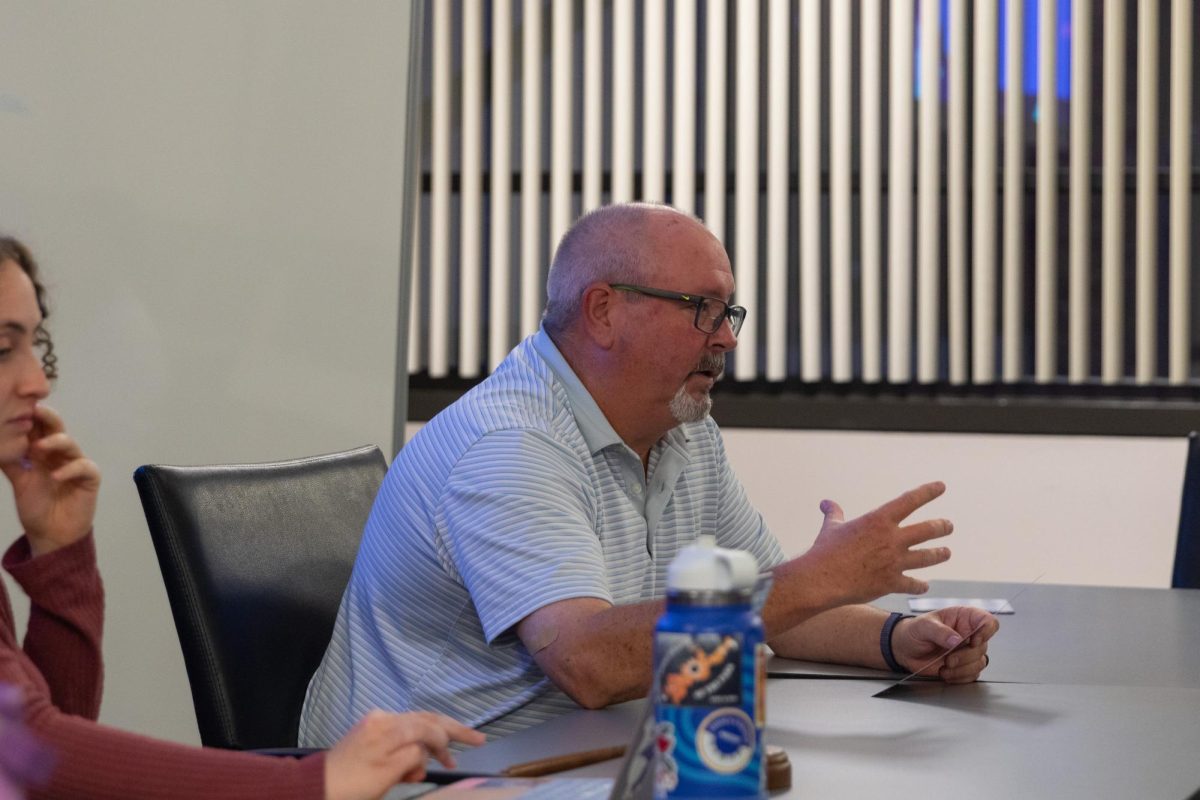Jim Daehn says his post-collegiate plans always included entering the professional work force. After graduating from SUNY-Oswego in 1992, Daehn founded a software company with two friends, but soon found the financial and market pressures were too much to handle and turned to teaching to better utilize his skills.

“I had a blast working professionally, but you know, starting a new company is so risky,” said Daehn, now an assistant professor of computer science at Ithaca College. “Teaching sort of fell into my lap, but I like that [teaching] is not so ‘dog-eat-dog’ as the corporate world.”
According to a recent study released by the Teachers Insurance and Annuity Association, College Retirement Equities Fund (TIAA-CREF), 96 percent of professors polled were either somewhat or very satisfied with their jobs. By comparison, a survey of American workers found only about 75 percent of employees were satisfied with their jobs.
Colin Stewart, assistant professor of theater arts, said he thought most professors at the college were satisfied, but each has his or her own reasons.
“The definition of job satisfaction varies from person to person,” he said. “I think what makes teaching in general feel like it has a significant level of satisfaction is the immediacy of the outcome: watching students grow and learn.”
Paul Yakoboski, a principal research fellow for TIAA-CREF, said the study
followed 300 full-time professors at four-year institutions and asked about their job satisfaction based on their balance between work and life, their salary, their relationships with colleagues and on an overall basis.
Yakoboski also said TIAA-CREF specifically looked at professors of different ages, surveying 100 professors from three generations: Generation X (born between 1965 and 1980), Late Baby Boomers (born between 1955 and 1964) and Early Baby Boomers (born between 1946 and 1954).
“We wanted to examine a mix of different generations’ reactions to their work,” Yakoboski said. “Based on the results, I wouldn’t say the general work force is miserable. It just seems that professors find their work more gratifying.”
Prior to conducting the survey,
Yakoboski said he assumed Generation X professors would be more interested in working in the professional world because they enjoy taking risks more than the older generations.
“At the end of the day, the generation differences didn’t really affect the respondents’ answers. It definitely surprised me,” he said.
Associate Provost David Garcia said the college has not conducted job satisfaction surveys in the past, but all faculty members on a tenure-track will participate in the Collaborative on
Academic Careers in Higher Education study this spring. COACHE is a joint initiative run by the Harvard Graduate School of Education that monitors retention rates and job satisfaction of professors.
“These surveys will help [the college] examine how we’re understanding faculty development on this campus,” he said.
Beth Ellen Clark Joseph, associate professor of physics, worked as a research assistant at Cornell University before joining the Ithaca College faculty in 2001. She said being a professor is time-consuming and stressful, but she enjoys working with people too much to return to the professional world.
“In research, it was just me and my computer every day. It was very lonely,” she said. “With teaching, I know I’m not going to go out and change the world, but my students might. And that’s exciting to me.”
Stewart, who spent around 20 years working on and off in the professional world, said despite the rewards, there are plenty of things that might turn people off to teaching, including low salary, administrative pressures and paperwork.
“Teaching is not a particularly glorious profession,” he said. “It doesn’t pay a lot of money, has a significant amount of stress related to it, has a lot of politics involved in it and all of this stuff that would cause a lack of job satisfaction. That’s why you have to truly love to teach.”
Clark Joseph, who has two adopted daughters from China, said one of the more difficult aspects of her job is trying to maintain her family and personal life because of scheduling and time commitments.
“In the professional world, if an emergency happens, you’ll probably be able to leave and only let down a few people,” she said. “If that happened to me, I would be letting down a classroom of 40, 50 or even 100 students.”
Clark Joseph said this kind of stress forces her to work a little harder to keep her life balanced, but it does not discourage her from continuing her career in education.
“Nobody could have convinced me that I couldn’t have it all,”
she said. “But I now know why it’s so difficult.”
Despite the difficulties, some professors, like Steve TenEyck, assistant professor and associate chair in the theater arts department, continue to dabble in the professional world in addition to their teaching duties. TenEyck, who works as a freelance lighting designer, said working in the professional world helps his teaching ability and lets him exercise creative energy.
“I have sort of an itch to scratch, and working in the real world helps me get that out,” he said.
For Daehn, teaching is not about the money or the praise — it’s about something more instinctual.
“I teach because that’s the way I’m wired,” he said. “It just makes sense to me.”







